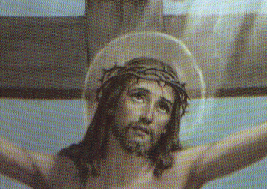
The "Our Father"
Profoundly fascinated by Jesus' prayer, the disciples says to him: "Lord, teach us to pray!" (Lk 11,1). And Jesus teachs them the "Our Father". This short prayer "it includes Jesus' teachings, as regards the relations with God, considered like a Father, as regards the ideal of the life and the the disciples' necessities" (Enrico Galbiati, Il <<Padre nostro>>, in Storia di Ges¨, ed. Rizzoli, vol 3, p.1057).
We have two versions of Our Father's prayer: Matthew's and Luke's. This one is the most short version. Probably, Luke's version may be more faithful to the prayer said by Jesus.
"He was praying in a certain place, and when he ceased, one of his disciples said to him: <<Lord, teach us to pray, has John taught his disciples>>. And he said to them: <<When you pray, say:
Father, halloved be thy name. Thy kingdom come. Give us each day our daily bread, and forgive us our sins, for we ourselves forgive every one who is indebted to us; and lead us not into temptation>>" (Lk 11,1-4).
"Father", it is the name used by Jesus towards his heavenly Father. But in Mark's gospel we read that the same Jesus prays his Father calling him: "abba", which means: Daddy.
"Halloved be thy name". In a version also accepted by the other christian churches, it means: "Do all men can recognize thee like God".
"Thy kingdom come". By these words Jesus auspicates the regality, that is God's sovereignty above peoples. In a different way of the powerful men of earth, God's sovereignty and regality is fulfilled not by force and power, but by the sincere acceptance of his Law, written in the hearts and in the consciences. A sovereignty and regality which requires the free choice of all the creatures. And when God's kingdom will be realized, God's will will be done: as in heaven as on earth.
"Give us each day our daily bread". With this request, it begins the second part of the "Our Father". When we demand our daily bread, we must seek, before all, God's kingdom, knowing all is given as well (Mt 6,33).
"And forgive us our sins, for we ourselves forgive every one who is indebted to us". Sin and debt are two words which show the same reality. We are always indebted in comparison with God, but freely He remits all to us, on condition that we also remit to other persons their offences committed towards us.
"and lead us not into temptation". This sentence concludes Luke's version of the "Our Father". It means: "Do, our Lord, we don't fall in the moments of the temptations".
Since Christian Community's first times, and perhaps already in the primitive Community, to Our Father's prayer has been added a liturgical rider which we can read in some gospels' manuscripts. It's inspired to the prayer attributed to David, as we are reading in the first book of the Chronicles (Ancient Testament): "Because Thy is the kingdom, Thy is the power and the glory in the centuries. Amen" (1 Cr. 29,11).
TO THE DISCOVERY OF JESUS OF NAZARETH